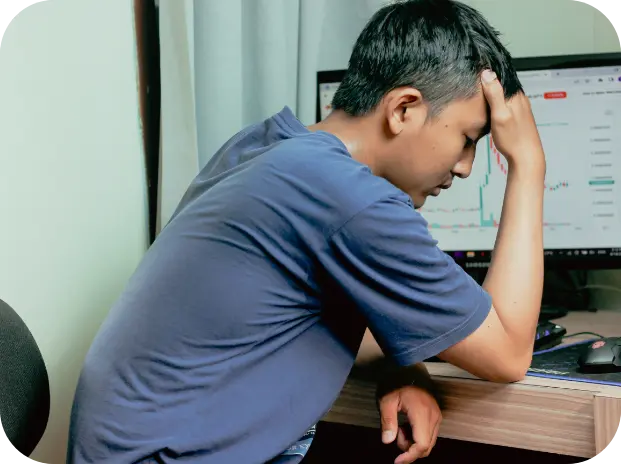We Accept Most PPO Insurance Policies
All calls and submitted forms are 100% confidential. Insurance could completely cover the cost of treatment


Approximately 14% of Californians face mental health challenges, with 1 in 26 experiencing serious mental illnesses. Despite a growing need for mental health services in recent years, only a fraction of those affected receive the necessary support. Various factors contribute to this issue, such as the stigma associated with mental health, a lack of understanding about symptoms, and limited access to effective or affordable care. Mental illness is a real medical condition that should be treated with the same care as other illnesses, as they can progress and result in a mental health crisis. Mental health inpatient facilities in California are intensive, overnight programs designed to help those with the most severe forms of mental health issues. Early intervention through outpatient treatment can prevent needing intensive residential care.
Moment of Clarity is dedicated to offering compassionate mental health treatment options tailored to the needs of Californians. Our outpatient facilities in Southern California create a safe and peaceful environment where many individuals can reclaim their mental well-being and lead fulfilling, productive lives. We offer intensive outpatient programs as alternatives to inpatient care or transitional support for those reintegrating into their daily routines. These outpatient programs provide the support necessary to tackle a variety of mental health challenges while allowing individuals to manage their work, school, and personal commitments.
In March 2024, California voters approved Proposition 1, which allocated $6.38 billion to enhance the state’s behavioral health system. This funding aims to improve mental health treatment, provide services for substance use disorders, and create supportive housing for those experiencing homelessness. Furthermore, several positive changes have helped strengthen California’s mental health system, including state and federal regulations that require insurance companies to offer equal coverage for mental health and substance use disorders alongside physical health services. The state also provides various free mental health resources, such as CalHope, which offers crisis counseling, referrals, and community support. Numerous public and private initiatives are underway to promote mental health education, improve access to care, and combat stigma. Despite these advancements, many Californians still do not receive the care they need.

California’s mental health services face significant challenges, including a shortage of providers, inconsistent access to behavioral health care, and a high demand for services. Despite these issues, U.S. News ranks California as the 8th best state for mental health, highlighting the broader national mental health crisis. Fortunately, the state is home to numerous high-quality mental health facilities. The Affordable Care Act mandates that most health insurance plans include coverage for mental health and substance use disorders, which can cover intensive treatment programs.
There are several options available for those struggling with their mental health, including mental health inpatient facilities in California. These programs are often best suited for individuals with severe mental health issues who need supervision around the clock, such as those struggling with suicidal ideation, psychotic episodes, and unable to care for themselves. These programs may also be ideal for individuals who need a break from everyday life to fully focus on their mental health recovery.
Individuals who are struggling with mild to moderate mental health issues can get the help they need through intensive outpatient programs for mental health. These programs offer similar therapeutic approaches and intensity as inpatient care but allow individuals to live at home, minimizing disruption to their daily responsibilities like work, school, or family life. Early intervention through outpatient mental health services can stop the progression of symptoms and help individuals avoid needing costly inpatient treatment services.
Mental illnesses are among the most common health conditions faced by Californians, with nearly one in seven adults experiencing a mental illness and one in 26 facing serious mental illness that hinders their ability to perform everyday tasks. Almost a quarter of adults with mental illness are unable to receive the care they need due to a massive shortage of mental health treatment professionals, and access to treatment varies by county. The lack of mental health professionals includes psychologists, licensed clinician social workers, and marriage and family therapists, who are the ones that often provide therapy, even for those with Medi-Cal insurance. California’s mental health system is under considerable pressure, with an increasing demand for services. There remains a critical shortage of acute care psychiatric hospital beds, leading to prolonged wait times for behavioral health services. Although the state has taken proactive steps to enhance mental health care infrastructure and services, substantial gaps still exist that hinder access to effective treatment.

In 2023, 31.7% of adults in California reported experiencing symptoms of anxiety and/or depression, which is slightly below the national average of 32.3%. Depression is a mood disorder that manifests through various symptoms, such as ongoing sadness, anxiety, feelings of emptiness, hopelessness, sleep issues, irritability, social withdrawal, fatigue, and trouble focusing. Additionally, depression can lead to serious complications, including heart disease, diabetes, and substance use disorders. Those affected by depression often find that their symptoms impact nearly every aspect of their lives, including work and personal relationships. Pursuing treatment for depression can significantly reduce symptoms and enable individuals to lead happier, more fulfilling lives. The most effective depression treatment approaches typically involve a combination of psychotherapy and medication. It is also crucial for those dealing with depression to adopt healthy lifestyle practices, such as regular exercise, balanced nutrition, and stress management techniques, to enhance their treatment. Unfortunately, many individuals do not receive the necessary care; between 2017 and 2019, only 36.8% of Californians with mental health issues sought any form of treatment.

Outpatient treatment programs at Moment Clarity serve as an excellent transition from mental health inpatient facilities in California. While residential programs offer essential 24/7 care to ensure safety and establish a strong recovery foundation, ongoing treatment is crucial as individuals reintegrate into their everyday lives. This support helps them effectively utilize their acquired coping skills and navigate real-life challenges. We provide various outpatient care options, including partial hospitalization programs (PHPs) and Intensive Outpatient Programs (IOPs), designed to be flexible and structured, enabling clients to balance their work and personal commitments while receiving the necessary support for their recovery journey.
Our programs also serve as an alternative to intensive inpatient programs for individuals who need more than weekly therapy sessions but not around-the-clock supervision. If mental health issues are impacting your daily life, seeking help is vital, as symptoms can escalate. Early intervention not only expands your options for mental health care but can also prevent the need for inpatient treatment and enhance overall outcomes. Moment of Clarity’s treatment facilities are conveniently located throughout Southern California, making it easier for clients to engage in their treatment programs. We offer a variety of evidence-based therapies and holistic approaches, customizing our programs to meet each client’s specific needs.
To learn more about our outpatient mental health treatment options, feel free to reach out to one of our admissions counselors at 949-625-0564.

